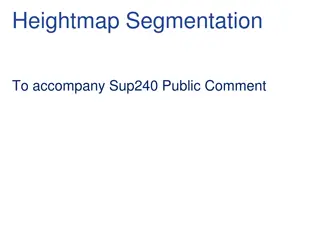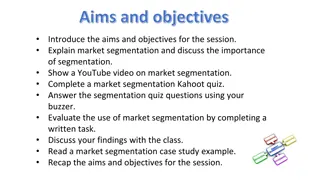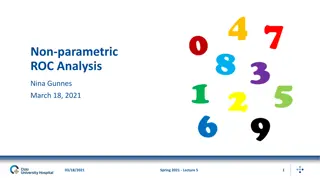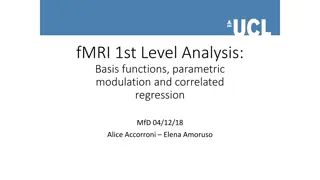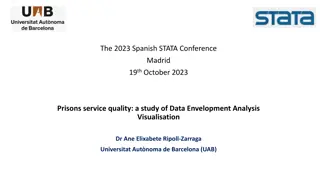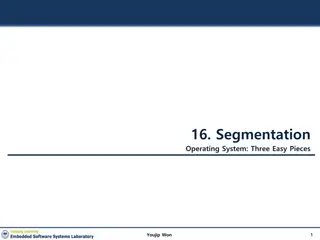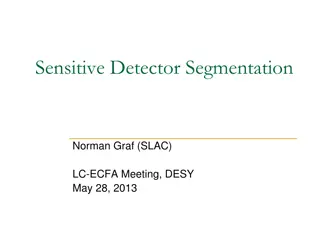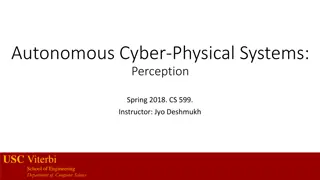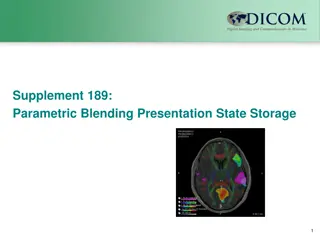Parametric Segmentation Functor for Array Content Analysis
This research delves into the development of a parametric segmentation functor for fully automatic and scalable analysis of array content. Addressing challenges like handling disjunction and ensuring all elements are initialized, the study explores concepts such as array smashing, scalability functor, and array materialization. It also discusses topics like removal, constant assignment, scalar variables abstraction, and array assignments for a comprehensive understanding of array manipulation and segmentation. The findings aim to enhance automated array analysis techniques with precision and efficiency.
Uploaded on Mar 12, 2025 | 1 Views
Download Presentation

Please find below an Image/Link to download the presentation.
The content on the website is provided AS IS for your information and personal use only. It may not be sold, licensed, or shared on other websites without obtaining consent from the author.If you encounter any issues during the download, it is possible that the publisher has removed the file from their server.
You are allowed to download the files provided on this website for personal or commercial use, subject to the condition that they are used lawfully. All files are the property of their respective owners.
The content on the website is provided AS IS for your information and personal use only. It may not be sold, licensed, or shared on other websites without obtaining consent from the author.
E N D
Presentation Transcript
A Parametric Segmentation Functor for Fully Automatic and Scalable Array Content Analysis Patrick Cousot, NYU & ENS Radhia Cousot, CNRS & ENS & MSR Francesco Logozzo, MSR
The problem: Array analysis public void Init(int[] a) { Contract.Requires(a.Length > 0); if j = 0 then a[0] not known else if j > 0 j a.Length a[0] = a[j-1] = 11 else impossible var j = 0; while (j < a.Length) { a[j] = 11; j++; } // here: k.0 k<j a[k]=11 } Challenge 2: Handling of disjunction Challenge 1: All the elements are initialized
Havent we solved it yet? Array smashin g Scalability Functor abstract domain Automation Automation Array partitions Template/ annotation based Theorem provers Array expansion Precision
Functor abstract domain by example
Array Materialization public void Init(int[] a) { Contract.Requires(a.Length > 0); Top {0} {a.Length}? var j = 0; Segment limits while (j < a.Length) { a[j] = 11; Segment abstraction j++; Possibly empty segment } }
? Removal public void Init(int[] a) { Contract.Requires(a.Length > 0); Top {0} {a.Length} var j = 0; while (j < a.Length) { a[j] = 11; Remove doubt j++; } }
Constant Assignment public void Init(int[] a) { Contract.Requires(a.Length > 0); var j = 0; Top {0,j} {a.Length} j:[0,0] while (j < a.Length) { a[j] = 11; j++; Record j = 0 } } Scalar variables abstraction (omit a.Length [1, + ))
Test public void Init(int[] a) { Contract.Requires(a.Length > 0); var j = 0; while (j < a.Length) { a[j] = 11; Top {0,j} {a.Length} j:[0,0] j++; } }
Array assignment public void Init(int[] a) { Contract.Requires(a.Length > 0); var j = 0; while (j < a.Length) { a[j] = 11; [11, 11] {0,j} {1, j+1} Top {a.Length}? j:[0,0] j++; } } Materialize segment Introduce ?
Scalar Assignment public void Init(int[] a) { Contract.Requires(a.Length > 0); var j = 0; while (j < a.Length) { a[j] = 11; j++; [11, 11] {0,j-1} {1,j} Top {a.Length}? j:[1,1] } } Replace j by j-1
Join public void Init(int[] a) { Contract.Requires(a.Length > 0); var j = 0; Top {0,j} {a.Length} j:[0,0] while (j < a.Length) { a[j] = 11; j++; [11, 11] {0,j-1} {1, j} Top {a.Length}? j:[1,1] } }
Segment unification 1. Unify the segments Top [11, 11] {0,j} {a.Length} {0,j-1} {1,j} Top {a.Length}? Top [11, 11] {0} {j}? {a.Length} {0} {j} Top {a.Length}? 2. Point-wise join [11, 11] {0} {j}? Top {a.Length}? Similar for order, meet and widening
After the first iteration public void Init(int[] a) { Contract.Requires(a.Length > 0); var j = 0; [11, 11] j [0,1] {0} {j}? Top {a.Length}? while (j < a.Length) { a[j] = 11; j++; } }
Test public void Init(int[] a) { Contract.Requires(a.Length > 0); var j = 0; while (j < a.Length) { a[j] = 11; [11, 11] j [0,1] {0} {j}? Top {a.Length} j++ } } Remove ?'
Array assignment public void Init(int[] a) { Contract.Requires(a.Length > 0); var j = 0; while (j < a.Length) { a[j] = 11; {0} [11,11] {j}? [11,11] {j+1}? Top {a.Length}? j [0,1] j++; } }
Scalar assignement public void Init(int[] a) { Contract.Requires(a.Length > 0); var j = 0; while (j < a.Length) { a[j] = 11; j++; j [1,2] {0} [11,11] {j-1}? [11,11] {j}? Top {a.Length}? } }
Widening public void Init(int[] a) { Contract.Requires(a.Length > 0); var j = 0; [11, 11] j [0,1] {0} {j}? Top {a.Length}? while (j < a.Length) { a[j] = 11; j++; j [1,2] {0} [11,11] {j-1}? [11,11] {j}? Top {a.Length}? } }
Fixpoint public void Init(int[] a) { Contract.Requires(a.Length > 0); var j = 0; [11, 11] j [0,+ ) {0} {j}? Top {a.Length}? while (j < a.Length) { a[j] = 11; j++; } }
Reduction public void Init(int[] a) { Contract.Requires(a.Length > 0); var j = 0; [11, 11] j [0,+ ) {0} {j}? Top {a.Length}? while (j < a.Length) { a[j] = 11; Remove the empty segment j++; } // here j a.Length } [11, 11] {j, a.Length} j [1,+ ) {0}
The Functor FunArray Given an abstract domain B for bounds S for segments E for scalar variables environment Constructs an abstract domain F(B, S, E) to analyze programs with arrays (Main) Advantages Fine tuning of the precision/cost ratio Easy lifting of existing analyses
Segment bounds Sets of symbolic expressions In our examples: Exp := k | x | x + k Meaning: { e0 en} { e 1 e m} e0= = en < e 1 = =e m { e0 en} { e 1 e m}? e0= = en e 1 = =e m Possibly empty segments are key for scalability
Disjunction: Partitions & co. public void CopyNonNull(object[] a, object[] b) { Contract.Requires(a.Length <= b.Length); var j = 0; for (var i = 0; i < a.Length; i++) { if (a[i] != null) { b[j] = a[i]; j++; } } }} Four partitions: j = 0 0 j< b.Length-1 j = b.Length-1 j = b.Length
Disjunction: Our approach public void CopyNonNull(object[] a, object[] b) { Contract.Requires(a.Length <= b.Length); var j = 0; for (var i = 0; i < a.Length; i++) { if (a[i] != null) { b[j] = a[i]; j++; } } }} NotNull j [0,+ ) {0} {j}? Top {b.Length}? Segmentation discovered by the analysis
Segment Abstraction Uniform abstraction for pairs (i, a[i]) More general than usual McCarthy definition Wide choice of abstract domains Fine tuning the cost/precision ratio Ex: Cardinal power of constants by parity [CC79] public void EvenOdd(int n) { var a = new int[n]; var i = 0; while (i < n) { a[i++] = 1; a[i++] = -1; } } even 1 odd -1 i [0,+ ) {0} {i, n, a.Length}?
Segmentation Unification Given two segmentations, find a common segmentation Crucial for order/join/meet/widening: 1. Unify the segments 2. Apply the operation point-wise In the concrete, a lattice of solutions In the abstract, a partial order of solutions Our algorithm tuned up by examples Details in the paper
Read: x = a[exp] Search the bounds for exp Bn An Am-1 Bm The search queries the scalar environment More precision A form of abstract domains reduction Set = [x An Am-1]
Write: a[exp] = x Search the bounds for exp Bn An Am-1 Bm Join the segments An .. Am-1 Bn Bm Split the segment An .. Am-1 (x) exp+1 An .. Am-1 Bn exp Bm Adjust emptiness May query scalar variables environment
Scalar assignment Invertible assignment x = g(x) Replace x by g-1(x) in all the segments Non-Invertible assignment x = g() Remove x in all the segments Remove all the empty segments Add x to all the bounds containing g()
Assumptions (and tests) Assume x == y Search for segments containing x/y Add y/x to them Assume x < y Adjust emptiness Assume x y Does the state implies x y ? If yes, Assume x == y Assumptions involving arrays similar
Implementation Fully implemented in CCCheck Static checker for CodeContracts Users: Professional programmers Array analysis completely transparent to users No parameters to tweak, templates, partitions Instantiated with Expressions = Simple expressions (this talk) Segments = Intervals + NotNull + Weak bounds Environment = CCCheck default
Results Main .NET v2.0 Framework libraries Un-annotated code Assembly # funcs base With functor # array invariants Mscorlib 21 475 4:06 4:15 0:09 2 430 System 15 489 3:40 3:46 0:06 1 385 System.Data 12 408 4:49 4:55 0:06 1 325 System.Drawing s System.Web System.Xml 3 123 0:28 0:29 0:01 289 23 647 10 510 4:56 3:59 5:02 4:16 0:06 0:17 840 807 Analyzes itself at each build (0 warnings) 5297 lines of annotated C#
More? Inference of quantified preconditions See our VMCAI 11 Paper Handling of multi-dimensional matrixes With auto-application Inference of existential facts When segments interpreted existentially Array purity check The callee does not modify a sub-array
To Sum up Fully Automatic Once the functor is instantiated No hidden hypotheses Compact representation for disjunction Enables Scalability Precision/Cost ratio tunable Refine the functor parameters Refine the scalar abstract environment Used everyday in an industrial analyzer 1% Overhead on average
Is this as Array Partitions? No [GRS05] and [HP07] They require a pre-determined array partition Main weakness of their approach Our segmentation is inferred by the analysis Totally automatic They explicitly handle disjunctions We have possibly empty segments
Calls Orthogonal issue In the implementation in CCCheck Havoc arrays passed as parameters Assignment of unknown if by ref of one element Assume the postcondition Array element passed by ref Ex: f(ref a[x]) The same as assignment a[x] = Top Assume the postcondition
Multiple arrays as parameters Orthogonal issue Depends on the underlying heap analysis In CCCheck: Optimistic hypotheses on non-aliasing FunArray easily fits in other heap models





